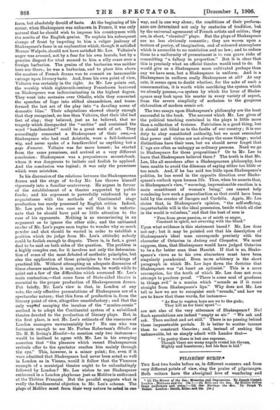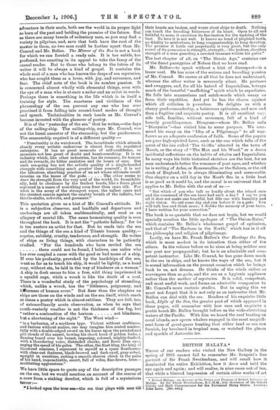PILGRIMS' SCRIP.* THE first two books before us, in different
manners and from very different points of view, sing the praise of pilgrimage& Both writers have the aboriginal love of wandering and * (1) The Mirror of the Sea: Memories and impressions. By Joseph Conrad. London : Methuen and Co. [6s.]—(2) Hills and the Sea. By Rilniro Belloo. Same publishers and price.—(S) Our Heritage the &a. By Brash T. Hallam London: Smith, Elder. and Co. [as.J
adventure in their souls, both see the world in its proper light is born of the past and bolding the promise of the future. But as there are many breeds of sedentary men, so you may find a variety in pilgrims, and, save that both have the root of the matter in them, no two men could be farther apart than Mr.
Conrad and Mr. Belloc. The Mirror of the Sea is not a book for which we can foretell a ready sale. It is too subtle, too
profound, too exacting in its appeal to take the fancy of the casual reader. But to those who belong to the totem of its writer it will be always a kind of gospel. It contains the whole soul of a man who has known the deeps of sea mysteries, who has sought them as a lover, with joy, and reverence, and fear. The chief note of the book is its sombre passion. It is concerned almost wholly with elemental things, seen with the eye of a man who is at once a sailor and an artist in words. Perhaps there is something in the life which is in itself a training for style. The exactness and vividness of the phraseology of the sea prevent any one who has ever practised it from falling into second-hand modes of thought and speech. Technicalities in such hands as Mr. Conrad's become invested with the glamour of poetry.
It is of the "yesterday of the sea" that he writes,—the days of the sailing-ship. The sailing-ship, says Mr. Conrad, was not the lineal ancestor of the steamship, but the predecessor. The seamanship required is of a different quality :—
" Punctuality is its watchword. The incertitude which attends closely every artistic endeavour is absent from its regulated enterprise. It has no great moments of self-confidence, or moments not less great of doubt and heart-searching. It is an industry which, like other industries, has its romance, its honour and its rewards, its bitter anxieties and its hours of ease. But such sea-going has not the artistic quality of a single-handed struggle with something much greater than yourself ; it is not the laborious, absorbing practice of an art whose ultimate result remains on the knees of the gods. . . . . . The other seems to draw its strength from the very soul of the world, its formidable ally, held to obedience by the frailest bonds, like a fierce ghost captured in a snare of something even finer than spun silk. For what is the array of the strongest ropes, the tallest spars and the stoutest canvas against the mighty breath of the infinite, but thistle-stalks, cobwebs, and gossamer."
This quotation gives us a hint of Mr. Conrad's attitude. He is a subjective observer, and landfalls and departures and anchoringa are all taken emblematically, and read as an allegory of mortal life. The same humanising quality is seen throughout the book. It is not the "pathetic fallacy," for he is too austere an artist for that. But he reads into the sea and the things of the sea a kind of Titanic human quality,—
caprice, subtlety, cruelty, tenderness, and strength. He writes of ships as living things, with characters to be patiently studied. "For the hundreds who have reviled the sea there could not be found, I believe, one sailor who has ever coupled it. curse with the good or bad name of a ship.
If ever his profanity, provoked by the hardships of the sea, went so far as to touch his ship, it would be lightly, as a hand may, without sin, be laid in the way of kindness on a woman."
A ship in dock seems to him a free, wild thing imprisoned in a squalid cage, while a wreck is like the death of a soul. There is a wonderful study of the psychology of stranding, which, unlike a wreck, has the "littleness, poignancy, and bitterness of human error." But finer than the chapters on ships are those on the winds and on the sea itself, which reach at times a poetry which is almost sublime. They are full, too, of extraordinarily acute observation, as when he says that south-westerly weather is not the thickness of the fog, but "rather a contraction of the horizon not blindness, bat a shortening of the sight." The West wind-
" is a barbarian, of a northern type. Violent without craftiness, and furious without malice, one may imagine him seated master- fully with a double-edged sword on his knees upon the painted and gilt clouds of the sunset, bowing his shock head of golden locks, a flaming beard over his breast, imposing, colossal, mighty-limbed, with a thundering voice, distended cheeks, and fierce blue eyes, urging the speed of his gales. The other, the East king, the king of blood-red sunrises, I represent to myself as a spare Southerner with clear-cut features, black-brewed and dark-eyed, gray-robed, upright in sunshine, resting a smooth-shaven cheek in the palm of his hand, impenetrable, secret, full of wiles, fine-drawn, keen— meditating aggressions."
We have little space to quote any of the descriptive passages on the sea, but we would mention an account of the rescue of
a crew from a sinking derelict, which is full of a mysterious terror looked upon- the true sea—the sea that plays with men till their hearts are broken, and wears stout ships to death. Nothing can touch the brooding bitterness of its heart. Open to all and faithful to none, it exercises its fascination for the undoing of the best. To love it is not well. It knows no bond of plighted troth, no fidelity to misfortune, to long companionship, to long devotion. The promise it holds out perpetually is very great, but the only secret of its possession is strength, strength,—the jealous, sleepless strength of a man guarding a coveted treasure within his gates."
The last chapter of all, on "The Heroic Age," contains one
of the finest panegyrics of Nelson that we have read.
Mr. Belloc—to speak without a hint of disrespect—is a lesser soul. He has none of the serious and brooding passion of Mr. Conrad. He sneers at all that he does not understand, whereas the other writer is reverently silent. He postures and swaggers, and, for all his hatred of Imperialism, betrays much of the boastful "mafficking" spirit which be repudiates: He falls into mannerisms and catch-words which weary us from their repetition. And yet he has the charm against
which all criticism is powerless. He delights us with a cheery good-comradeship, a boisterous optimism, and now and then a fugitive and exquisite poetry. It is all excellent way- side talk, familial., without reverence, full of a. kind of
homely grandiloquence. Dionysus—whom Mr. Belloc calls " Dionysius "—has visited him to some purpose. We 'com- mend his essay on the "Idea of a Pilgrimage" to all way- farers as an adequate confession of faith. Some of the papers are pure high-spirited farce, such as the one which tells of the quest of the inn called The Griffin' situated in the town of March, or the story of "The Man and his Wood," or a dozen incidental reflections on the habits of whales and Imperialisbi. In many ways his little historical sketches are the best, for no man understands better the romance of past ages, and whether he is writing of Arles, or Roncesvalles, or the Sahara, or the old stock of England, be is always illuminating and memorable. One chapter on a wild day in the North Sea in a little boat is as good as it could be, and the moral is so universal that it applies to Mr. Belloc with the rest of us :—
"But which of you who talk so loudly about the island race and the command of the sea have had such a day ? I say to you all it does not make one boastful, but fills one with humility and right vision. Go out some day and run before it in a gale. You will talk less and think more ; I dislike the memory of your faces. I have written for your correction."
The book is so quotable that we dare not begin, but we would specially mention the little apologue of "The Onion-Eater," which contains Mr. Belloc's wholesome gospel of optimism, and that of "The Harbour in the North," which has in it all the philosophy and religion of pilgrimage.
Lastly, we have Mr. Frank Bullen's Our Heritage the Sea, which is more modest in its intention than either of the others. In the volume before us he aims at being neither seer nor poet nor propagandist; but be is an admirable and com- petent instructor. Like Mr. Conrad, he has gone down much to the sea in ships, and he knows the ways of the sea, but it is sound information on the present occasion which he brings back to us, not dreams. He thinks of the winds rather as
scavengers than as gods, and the sea as a hygienic appliance rather than the mother of mysteries. It is solid, competent, and most useful work, and forms an admirable companion to Mr. Conrad's more esoteric studies. But in saying this we
must not forget that it is not only as an instructor that Mr. Bullen can deal with the sea. Readers of his exquisite little book, Idylls of the Sea, the greater part of which appeared in these pages, will remember with how sure and exquisite a poetic touch Mr. Bullen brought before us the wide-stretching
waters of the Pacific. With him we beard the surf beating on coral islands, saw sperm whalers engaged in the most magnifi- cent form of great-game hunting that either land or sea can furnish, lay becalmed in tropical seas, or watched the gleam and sparkle of Antarctic ice.































































 Previous page
Previous page